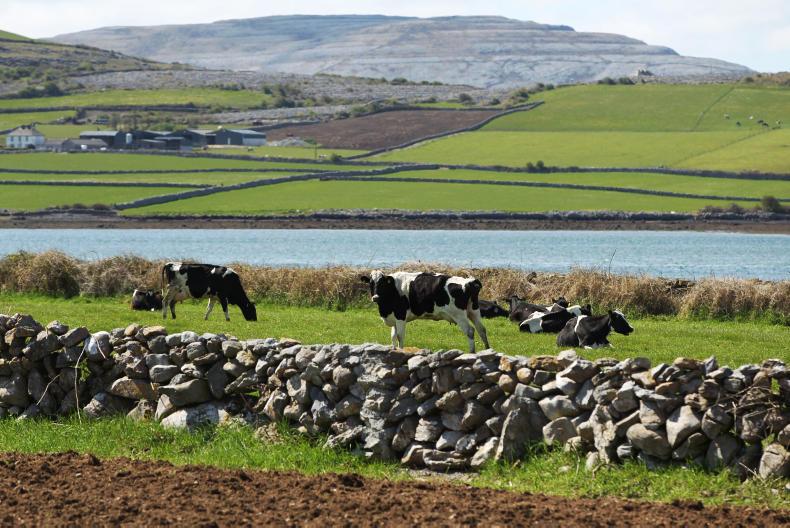The early weeks and months of 2019 will be a critical time in Irish politics, a time when crucial decisions affecting the future of the country – particularly the future of rural Ireland – will be made. Foremost in most people’s minds, of course, is the challenge of Brexit and its implications for this country. Less to the fore, but potentially of equal consequence, are pending decisions in the area of climate politics.
At present, the Oireachtas Committee on Climate Action, established by the Government in early July to consider how to implement the recommendations of the Citizens’ Assembly, is approaching the end of its deliberations. Its report is due by 31 January 2019. The topic assigned to the Citizens’ Assembly was: “How the State can make Ireland a leader in tackling climate change.” On the basis of the information presented to it, the assembly made the radical recommendation that climate change be placed at the centre of policy-making in Ireland. Among many other measures, it recommended that there should be a tax on greenhouse gas emissions from agriculture.
Since the Oireachtas committee was set up, there have been political developments indicating that many Oireachtas members believe we are currently facing a climate emergency of such a scale that our own national interests must be subordinated to global imperatives. In July the Dáil passed the Fossil Fuel Divestment Bill, which will oblige the country to drop its coal, oil and gas investments. Ireland will then become the only country in the world to have adopted such a measure. In August, a Climate Emergency Bill, intended to ban any further exploration for oil or gas in Irish waters, passed its third Dáil stage. The sponsors of this latter bill have made it clear that they intend it to be the first of many climate emergency bills.
Targets
Paradoxically, these bills go far beyond anything Ireland is required to do under its EU climate obligations and come at a time when the country is struggling to meet these obligations. Our current failure to meet our EU targets is not due to moral weakness, but arises from our particular national circumstances. In the first place, Ireland is a food exporting country with agricultural emissions that account for a third of our total, as compared with an EU average of a 10th. Secondly, we have a dispersed rural population and cities with low population density, making it difficult to avoid extensive car usage. Thirdly, we have an expanding economy and, largely due to immigration, a growing population.
Is it appropriate, given these circumstances, for Ireland to aspire to world leadership in reducing its greenhouse gas emissions? If we are indeed in a planetary emergency with catastrophic global climate change imminent, then all conceivable measures to reduce emissions would have to be taken immediately, regardless of cost. If, on the other hand, what we are facing is a long-term threat, then vital national interests as well as global obligations may legitimately be taken into account.
As a practising professional in the area of climate science, I do not see the current scientific evidence as indicating we are in a state of planetary emergency. I am far from being alone among my scientific colleagues in holding this view. I believe the current evidence in this still unsettled science indicates that reasonable precautionary measures to reduce emissions should be taken on the basis of risk, but it does not require that we seriously damage our economy or bring our traditional way of life to an end in the process.
Few studies have been carried out in Ireland on the costs of climate action. One such study is that of the Irish Academy of Engineering, which estimated in 2016 that the cost to Ireland of meeting its EU-mandated 2030 targets, not including agriculture, will be in excess of €35bn. This amounts to over €20,000 per household.
I have written elsewhere of why I consider the scientific information on climate change presented to the Citizens’ Assembly to be lacking in scientific impartiality. Here, I want to comment on the recent Special Report on a Global Warming of 1.5°C issued by the Intergovernmental Panel on Climate Change (IPCC) in advance of the COP24 Climate Summit in Poland, which has just ended.
I have done a careful study of this report and have written a 12-page critique of it entitled Deficiencies of the IPCC’s SR1.5 Special Report. This critique has just been published by the Global Warming Policy Foundation in London.
The deficiencies I have identified in the SR1.5 report are as follows.
It departs from the IPCC’s Fifth Assessment Report (2013) in conveying an increased sense of planetary emergency without giving rigorous scientific reasons for doing so.It fails to communicate to policymakers a considerable body of important scientific evidence that has accumulated since 2013 which reduces the sense of a looming emergency.It fails to communicate important information made public by climate modellers since 2013 regarding the empirical adjustment of models to achieve desired results.In view of these deficiencies, the IPCC SR1.5 report does not merit being regarded as a scientifically rigorous document. There is much recent scientific evidence, not referred to in the report, to support a view that a more considered mitigation strategy than the one it proposes is called for.
It would not be prudent for our policymakers to use the SR1.5 report to advance a case that Ireland should aspire to costly world leadership in climate action.
Ray Bates is adjunct professor of meteorology at UCD. He was formerly a senior scientist at NASA’s Goddard Space Flight Centre and head of research at Met Éireann. He is a member of the Royal Irish Academy and the Academia Europaea.
The early weeks and months of 2019 will be a critical time in Irish politics, a time when crucial decisions affecting the future of the country – particularly the future of rural Ireland – will be made. Foremost in most people’s minds, of course, is the challenge of Brexit and its implications for this country. Less to the fore, but potentially of equal consequence, are pending decisions in the area of climate politics.
At present, the Oireachtas Committee on Climate Action, established by the Government in early July to consider how to implement the recommendations of the Citizens’ Assembly, is approaching the end of its deliberations. Its report is due by 31 January 2019. The topic assigned to the Citizens’ Assembly was: “How the State can make Ireland a leader in tackling climate change.” On the basis of the information presented to it, the assembly made the radical recommendation that climate change be placed at the centre of policy-making in Ireland. Among many other measures, it recommended that there should be a tax on greenhouse gas emissions from agriculture.
Since the Oireachtas committee was set up, there have been political developments indicating that many Oireachtas members believe we are currently facing a climate emergency of such a scale that our own national interests must be subordinated to global imperatives. In July the Dáil passed the Fossil Fuel Divestment Bill, which will oblige the country to drop its coal, oil and gas investments. Ireland will then become the only country in the world to have adopted such a measure. In August, a Climate Emergency Bill, intended to ban any further exploration for oil or gas in Irish waters, passed its third Dáil stage. The sponsors of this latter bill have made it clear that they intend it to be the first of many climate emergency bills.
Targets
Paradoxically, these bills go far beyond anything Ireland is required to do under its EU climate obligations and come at a time when the country is struggling to meet these obligations. Our current failure to meet our EU targets is not due to moral weakness, but arises from our particular national circumstances. In the first place, Ireland is a food exporting country with agricultural emissions that account for a third of our total, as compared with an EU average of a 10th. Secondly, we have a dispersed rural population and cities with low population density, making it difficult to avoid extensive car usage. Thirdly, we have an expanding economy and, largely due to immigration, a growing population.
Is it appropriate, given these circumstances, for Ireland to aspire to world leadership in reducing its greenhouse gas emissions? If we are indeed in a planetary emergency with catastrophic global climate change imminent, then all conceivable measures to reduce emissions would have to be taken immediately, regardless of cost. If, on the other hand, what we are facing is a long-term threat, then vital national interests as well as global obligations may legitimately be taken into account.
As a practising professional in the area of climate science, I do not see the current scientific evidence as indicating we are in a state of planetary emergency. I am far from being alone among my scientific colleagues in holding this view. I believe the current evidence in this still unsettled science indicates that reasonable precautionary measures to reduce emissions should be taken on the basis of risk, but it does not require that we seriously damage our economy or bring our traditional way of life to an end in the process.
Few studies have been carried out in Ireland on the costs of climate action. One such study is that of the Irish Academy of Engineering, which estimated in 2016 that the cost to Ireland of meeting its EU-mandated 2030 targets, not including agriculture, will be in excess of €35bn. This amounts to over €20,000 per household.
I have written elsewhere of why I consider the scientific information on climate change presented to the Citizens’ Assembly to be lacking in scientific impartiality. Here, I want to comment on the recent Special Report on a Global Warming of 1.5°C issued by the Intergovernmental Panel on Climate Change (IPCC) in advance of the COP24 Climate Summit in Poland, which has just ended.
I have done a careful study of this report and have written a 12-page critique of it entitled Deficiencies of the IPCC’s SR1.5 Special Report. This critique has just been published by the Global Warming Policy Foundation in London.
The deficiencies I have identified in the SR1.5 report are as follows.
It departs from the IPCC’s Fifth Assessment Report (2013) in conveying an increased sense of planetary emergency without giving rigorous scientific reasons for doing so.It fails to communicate to policymakers a considerable body of important scientific evidence that has accumulated since 2013 which reduces the sense of a looming emergency.It fails to communicate important information made public by climate modellers since 2013 regarding the empirical adjustment of models to achieve desired results.In view of these deficiencies, the IPCC SR1.5 report does not merit being regarded as a scientifically rigorous document. There is much recent scientific evidence, not referred to in the report, to support a view that a more considered mitigation strategy than the one it proposes is called for.
It would not be prudent for our policymakers to use the SR1.5 report to advance a case that Ireland should aspire to costly world leadership in climate action.
Ray Bates is adjunct professor of meteorology at UCD. He was formerly a senior scientist at NASA’s Goddard Space Flight Centre and head of research at Met Éireann. He is a member of the Royal Irish Academy and the Academia Europaea.









SHARING OPTIONS